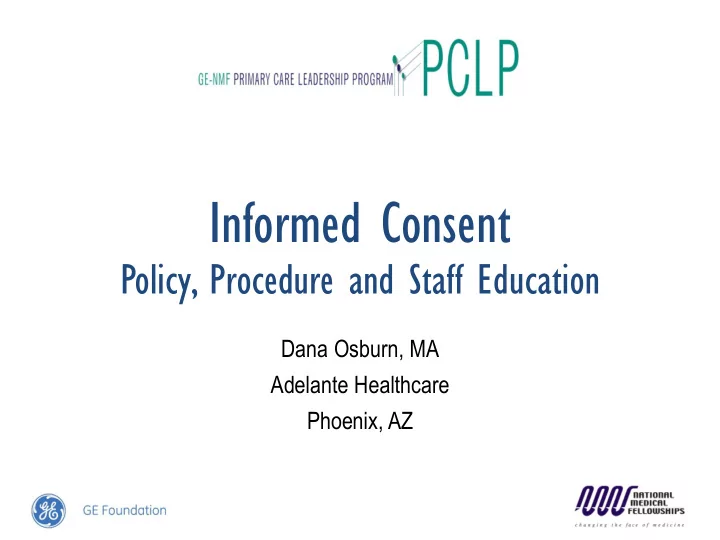

Informed Consent Policy, Procedure and Staff Education Dana Osburn, MA Adelante Healthcare Phoenix, AZ
Introduction • Informed Consent Definition: • “…advising a patient of a proposed medical procedure, alternatives to that medical procedure, associated risks and possible complications, and obtaining authorization of the patient or the patient’s representative for the procedure” (Arizona State Board of Nursing). • Every healthcare institution must now have a set of policies and procedures in place outlining the proper use of informed consent. • Adelante Healthcare was in need of updating and finding legal references for their procedure. The quality department also wanted to ascertain their providers’ knowledge of the informed consent process.
Background- Historical Context • The idea that surgeons must obtain consent from a patient before a procedure dates to eighteenth century England. • Law developed from the intentional tort of battery- no individual should have any unwanted touching. • Now considered to be negligence on the part of the physician • Only since a California case in 1957 was it decided that the patient needed to be “informed” in order for the consent to be valid. • Salgo vs. Leland Stanford Jr.- patient given an aortogram and not advised of the risks of using the contrast medium.
Methodology • Research completed on the internet to verify federal and Arizona state laws related to informed consent processes. • Additional research completed by examining best clinical practices of other healthcare entities. • Provider Survey: Asked several questions about the informed consent process including naming three procedures requiring informed consent, time providers take to obtain consent for a procedure, etc. • Surveys developed through Survey Monkey and emailed to all Adelante Healthcare providers and chief administrators.
Results • 43% Response Rate (23 out of 53) • All procedures named by the physicians did require some form of informed consent Colposcopy, 3 Sutures, 3 Joint Injection, 2 IUD Insertion, 4 Ear Lavage, 5 Other, 6 Biopsy, 8 I&D, 12 Surgery, 2 Wart removal/Cryotherapy, 7 Toenail, 9
Results • 26% of physicians surveyed correctly stated that the patient (or legal guardian), provider and a witness needed to sign the informed consent form • An additional 22% stated that at least the patient (or legal guardian) and provider were required to sign the form. • 70% of the physicians gave a specific time frame that they spend explaining a procedure to patients and asking if they have questions • Average of 6.36 min • 30% of the physicians stated they will spend as much time as necessary to explain the procedures.
Results- Comments and Concerns • Last question was open for all surveyed to express any questions or concerns about the informed consent process • Minor procedures like ear lavage or wart removal seem overkill • Informed consent does not protect provider medicolegally • Pts initially agree then change mind due to financial reasons • Getting forms scanned into charts • Spanish Interpretation • Minors-confusion on what needs parental consent • Patient’s denial phase • What the exact process is and forms that are needed • Remembering to do on small procedures • Exactly which procedures need informed consent
Discussion • The quality department is looking at the results from the survey and will possibly implement training once the informed consent procedure is finalized. • Educational Poster: Based on the comments from the last survey question, a double-sided poster was made outlining the procedures requiring informed consent. • One side outlines procedures requiring written consent and the other side lists procedures needing only verbal consent. • Meant to be a quick reference guide so providers understand exactly which procedures need informed consent.
Recommendations • Providers will be given quick reference posters with the procedures requiring verbal and/or written consent. • Quality department is interested in possibly using the survey to post-test providers after training. • Recommendations for the policy and procedure have been given to the quality department along with all legal and clinical references used during my research.
Conclusion • Adelante Healthcare now has the legal and clinical references needed to verify points made in their informed consent policy. • Although response rate was low (43%) Adelante Healthcare can use this information to train and re- evaluate their providers
Acknowledgements • Dr. Gayla Wigal • Shamim Tejani • Audrey Bohanan • Dr. Doug Campos-Outcalt
Recommend
More recommend